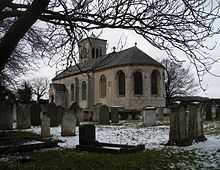Firbeck
| Firbeck | |
 Firbeck |
|
| Population | 317 (2001) |
|---|---|
| Civil parish | Firbeck |
| Metropolitan borough | Rotherham |
| Metropolitan county | South Yorkshire |
| Region | Yorkshire and the Humber |
| Country | England |
| Sovereign state | United Kingdom |
| Post town | WORKSOP |
| Postcode district | S81 |
| Dialling code | 01709 |
| Police | South Yorkshire |
| Fire | South Yorkshire |
| Ambulance | Yorkshire |
| EU Parliament | Yorkshire and the Humber |
| UK Parliament | Rother Valley |
Coordinates: 53°23′30″N 1°09′00″W / 53.3917°N 1.15°W
Firbeck is a village and civil parish in the Metropolitan Borough of Rotherham in South Yorkshire, England, on the border with Nottinghamshire. It lies between Maltby and Oldcotes, off the A634 and B6463 roads. Firbeck has a population of 317.[1]
Village amenities include The Black Lion public house, and St Martin's Church.
History

The place name Firbeck is said to derive from 'Friebec, meaning "a wooded stream".
An oval field in the village marks what was once the private racecourse of 18th century racehorse owner Anthony St Leger, who originated the St. Leger Stakes. While the first "St. Leger" race was held on Cantley Common in Doncaster in 1776, and was not so named until over a year later, local legend holds that the race was being run in Firbeck prior to this.
Anthony St Leger's Park Hill estate in Firbeck also gave its name to a race in the Doncaster calendar.
Firbeck Hall
Firbeck Hall was formerly the home of 19th-century architect and writer Henry Gally Knight who is assumed to have been a principal information source for Walter Scott during the writing of Ivanhoe. Firbeck Hall was built in 1594 by William West, who made a fortune practising law and serving as an associate to Gilbert Talbot, 7th Earl of Shrewsbury from 1580 to 1594. West was the author of a legal textbook called Symbolaeographia. In his will of 1598, West stipulated that "a grave stone be set for me and my said wife in Firbeck Church, and ingraven with our arms and names and some posy."[2][3]
Country Club
In 1935 a Sheffield stockbroker, Cyril Nicholson, opened the hall as a country club, investing £80,000 in its renovation. The interior was dramatically modernised and featured a mirror-walled ballroom and an elaborate and versatile state-of-the-art lighting system. There was also a heated outdoor swimming pool. Membership fees ranged from three to seven guineas, and the club was patronised by the likes of Amy Johnson and the then Prince of Wales. Such was the reputation of the club, that the BBC transmitted its weekly Saturday show "Late Night Dance Music" with Henry Hall, Carroll Gibbons and Charlie Kunz from Firbeck.
Second World War – present day
At the outbreak of the Second World War, the hall was used by Sheffield Royal Infirmary and the Royal Air Force, with the adjacent aerodrome becoming RAF Firbeck. After the War, the building was bought by the Miners Welfare Commission for use as a rehabilitation centre for injured miners. This centre closed in 1984. It was purchased by Cambridge Construction. From then the Hall fell into a state of disrepair.
References
External links
![]() Media related to Firbeck at Wikimedia Commons
Media related to Firbeck at Wikimedia Commons